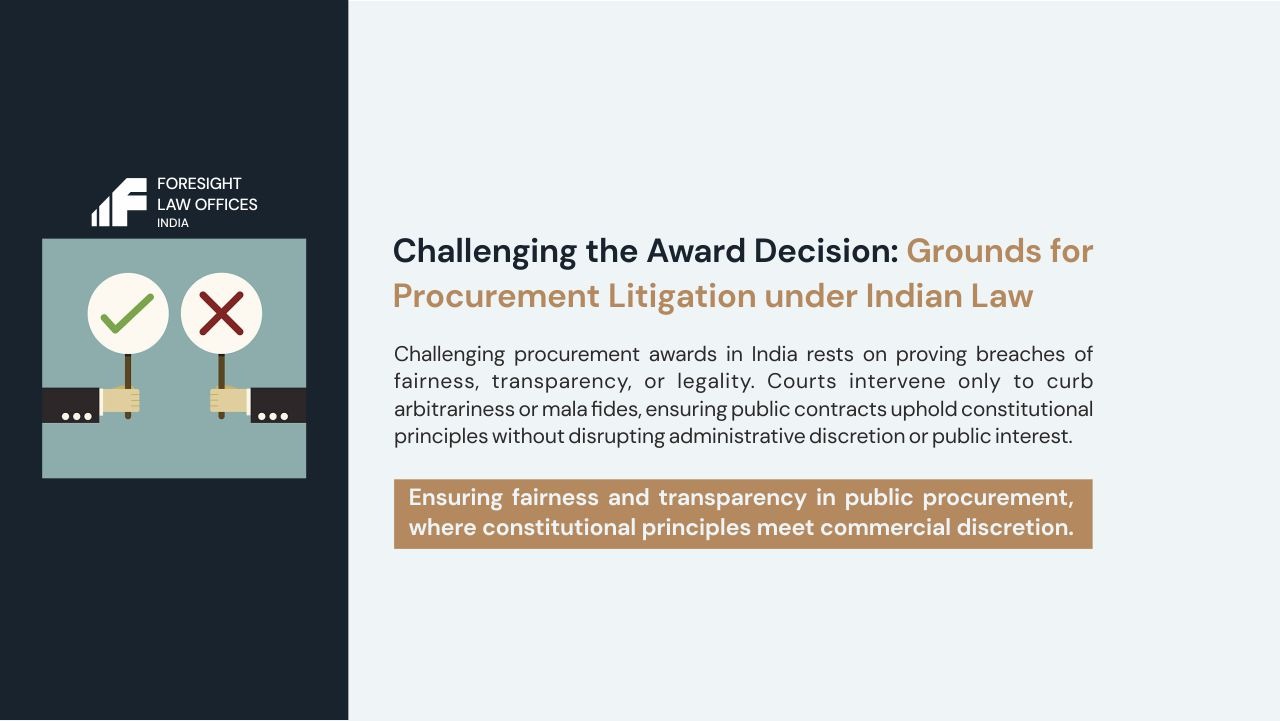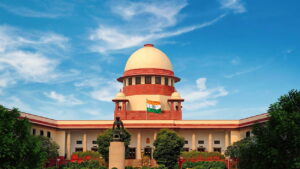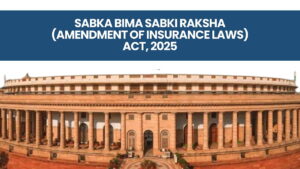Introduction
Public procurement in India represents a critical intersection of administrative discretion, economic efficiency, and legal accountability. Government contracts form a substantial portion of public expenditure, and the process of awarding such contracts must therefore adhere to principles of fairness, transparency, and equality. However, despite elaborate procurement frameworks and judicial oversight, disputes often arise concerning the fairness or legality of award decisions. This blog explains the grounds for procurement litigation under Indian law.
Challenging a procurement award is not a mere commercial dispute; it is a test of administrative propriety and the integrity of public decision-making. This article examines the legal basis for challenging contract award decisions under Indian law, focusing on grounds for procurement litigation such as breach of fairness, lack of transparency, and manifest error. It also explores the remedies available to aggrieved bidders and the evolving judicial approach to procurement litigation.
Legal Framework Governing Public Procurement in India
Unlike some jurisdictions that have a single codified procurement statute, India’s legal framework for public procurement is fragmented across various rules, manuals, and judicial precedents. Key instruments include:
- General Financial Rules, 2017 (GFRs) – laying down basic principles of public procurement by central government entities.
- Manual for Procurement of Goods, Works and Consultancy (Ministry of Finance, 2022) – providing operational guidelines for tendering and award.
- Public Procurement (Preference to Make in India) Order, 2017, under the Department for Promotion of Industry and Internal Trade (DPIIT).
- State-specific legislations, such as the Rajasthan Transparency in Public Procurement Act, 2012 and the Tamil Nadu Transparency in Tenders Act, 1998.
- Judicial review under Articles 14, 19(1)(g), and 226 of the Constitution of India, which serves as the ultimate legal recourse.
Thus, challenges to award decisions in India are primarily pursued through constitutional remedies, particularly writ petitions under Article 226 before High Courts, rather than specialized procurement tribunals.
Principles Governing Award Decisions
The Supreme Court of India has consistently emphasized that government contracts, while commercial in nature, must adhere to constitutional principles of equality and fairness. Key cases such as Tata Cellular v. Union of India (1994) 6 SCC 651 and Michigan Rubber (India) Ltd. v. State of Karnataka (2012) 8 SCC 216, have clarified that tender evaluation is subject to judicial review on limited grounds, primarily to ensure the absence of arbitrariness, mala fides, or irrationality.
Core Principles
- Fairness – Every bidder must have an equal opportunity to compete. Any bias or unequal treatment can invalidate the award.
- Transparency – Tender conditions and evaluation criteria must be clear, objective, and consistently applied.
- Non-arbitrariness – Administrative discretion must not be exercised capriciously or in bad faith.
- Proportionality and reasonableness – The decision must be rationally related to the tender’s objectives.
These principles flow directly from Article 14 of the Constitution, which mandates equality before the law and prohibits arbitrary state action.
Grounds for Challenging an Award Decision
When an unsuccessful bidder seeks to challenge a contract award, the claim generally rests on one or more of the following grounds for procurement litigation:
- Breach of Fairness and Equality
A fundamental ground for challenge is that the procurement authority breached the duty of fairness. This may arise when one bidder is granted preferential treatment, or evaluation criteria are altered mid-process.
In Sterling Computers Ltd. v. M&N Publications Ltd. (1993) 1 SCC 445, the Supreme Court held that even in contractual matters, public authorities must act fairly. The Court emphasized that while the State is free to choose its contracting party, the choice must not be arbitrary or irrational.
A breach of fairness may occur in cases where:
- Evaluation parameters are applied selectively.
- Clarifications are sought from only one bidder.
- Disqualification occurs on trivial or technical grounds while others are overlooked.
- Post-tender negotiations are conducted non-uniformly.
Courts typically interfere in cases where such breaches affected the integrity of competition.
- Lack of Transparency
Transparency is the linchpin of public procurement. Any process that obscures evaluation methods, conceals decision-making rationale, or withholds information essential to fair competition may be invalidated.
For instance, in Reliance Energy Ltd. v. Maharashtra State Road Development Corporation Ltd. (2007) 8 SCC 1, the Supreme Court struck down an award decision for lack of transparency, holding that the tender evaluation criteria were unclear and allowed subjective interpretation.
Transparency breaches often involve:
- Vague or inconsistent evaluation matrices.
- Undisclosed scoring methods or weightages.
- Failure to publish reasons for rejection.
- Unexplained deviations from tender conditions.
The judiciary expects authorities to maintain procedural clarity, not merely as a formality but as a safeguard against arbitrariness.
- Manifest Error or Irrational Decision-Making
Courts are generally reluctant to second-guess technical evaluations. However, they will intervene when a decision is so unreasonable that no reasonable authority could have reached it, a concept drawn from the Wednesbury principle of judicial review.
In Tata Cellular v. Union of India (1994) 6 SCC 651, the Supreme Court laid down that the scope of judicial review extends to cases of illegality, irrationality, and procedural impropriety, but not to the merits of the decision itself.
A manifest error may arise when:
- The evaluation committee misinterprets tender documents.
- Mathematical or factual mistakes affect scoring.
- The awardee fails to meet mandatory eligibility criteria.
The threshold for manifest error is high; it must be demonstrable on the face of the record.
- Mala Fide or Bias
If evidence suggests that the award decision was influenced by extraneous considerations, political pressure, personal relationships, or corruption, the court may strike it down as mala fide.
In Union of India v. Hindustan Development Corporation (1993), the Court recognized the danger of “cartelization” and favoritism in government contracts and stressed the need for impartial administration.
Proof of mala fides is often difficult, but circumstantial evidence such as last-minute rule changes or inexplicable preference can raise judicial suspicion.
- Breach of Legitimate Expectation
Bidders may also challenge decisions based on legitimate expectation, a doctrine that protects individuals from abrupt administrative reversals. If the government deviates from established tender procedures or assurances without justification, affected parties may claim violation of legitimate expectation.
However, as clarified in Union of India v. International Trading Co. (2003) 5 SCC 437, legitimate expectation does not guarantee a contract award; it ensures procedural fairness in decision-making.
Remedies Available
When an award decision is successfully challenged, courts may grant a variety of remedies, balancing public interest with private rights.
- Judicial Review under Article 226
The most common remedy is to seek a writ of certiorari or mandamus before a High Court, challenging the award’s legality. Courts may:
- Quash the award decision.
- Direct the authority to re-evaluate bids.
- Order re-tendering.
- In rare cases, direct the award of contract to the petitioner.
However, courts are cautious not to disrupt ongoing projects of public importance. The guiding consideration remains in the public interest rather than the commercial interest of individual bidders.
- Injunctions and Interim Relief
Aggrieved bidders often seek interim injunctions to restrain the execution of the awarded contract pending litigation. High Courts exercise discretion carefully, granting such relief only when:
- There is a prima facie case.
- Irreparable harm would result otherwise.
- The balance of convenience favors the applicant.
In urgent procurement projects, such as infrastructure or defense, courts often prefer expedited hearings over injunctions to avoid public loss.
- Damages
While rare, damages may be awarded for loss caused by arbitrary exclusion or wrongful disqualification. However, Indian courts traditionally avoid awarding substantial damages in public procurement cases due to the speculative nature of lost commercial opportunities.
Nonetheless, under ordinary contract law principles (Sections 73–75, Indian Contract Act, 1872), a bidder can claim compensation if a concluded contract was breached after award.
- Blacklisting and De-Blacklisting Challenges
Procurement disputes sometimes intersect with blacklisting orders. Courts have recognized blacklisting as a serious civil consequence requiring due process (Erusian Equipment & Chemicals Ltd. v. State of West Bengal, AIR 1975 SC 266). Thus, challenges may extend beyond award decisions to the broader conduct of procurement authorities.
Balancing Judicial Restraint and Accountability
Indian courts maintain a delicate balance between judicial restraint and accountability in governance. The judiciary avoids substituting its decision for that of the authority but ensures the decision meets constitutional standards.
In Jagdish Mandal v. State of Orissa (2007) 14 scc 517, the Supreme Court held that courts should intervene only when:
- The process is mala fide or intended to favor someone.
- The decision is arbitrary and irrational.
- Public interest is adversely affected.
Thus, the focus is not on the correctness of the award but on its legality, fairness, and reasonableness.
Conclusion
Challenging procurement awards in India requires navigating the complex interface of administrative law and commercial decision-making. The key takeaway from judicial precedent is that the court’s role is supervisory, not appellate. The judiciary ensures that public authorities act within the bounds of law, guided by transparency and fairness, without usurping their administrative discretion.
For bidders, understanding these principles is essential; challenges should be grounded in demonstrable illegality or arbitrariness, not mere dissatisfaction. For procurement authorities, the lesson is equally clear: rigorous documentation, objective evaluation, and reasoned decision-making are the best defenses against litigation.
As India moves toward a more digitized and transparent procurement ecosystem, through portals like the Government e-Marketplace (GeM), these legal principles will continue to safeguard both public interest and the rule of law.






